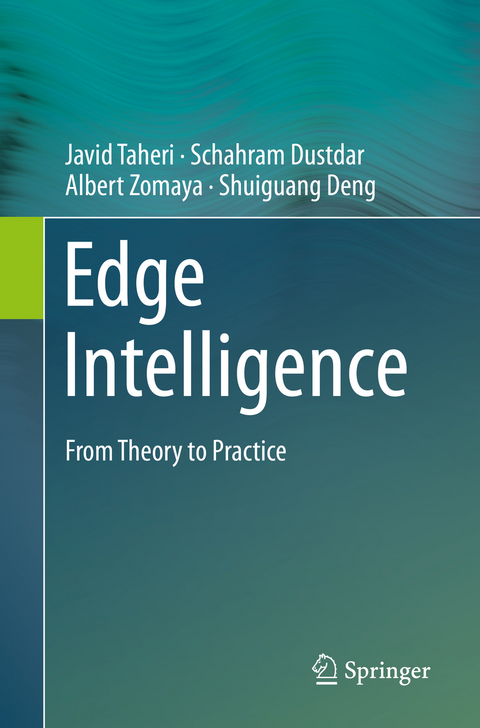
Edge Intelligence
Springer International Publishing (Verlag)
978-3-031-22154-5 (ISBN)
This graduate-level textbook is ideally suited for lecturing the most relevant topics of Edge Computing and its ties to Artificial Intelligence (AI) and Machine Learning (ML) approaches. It starts from basics and gradually advances, step-by-step, to ways AI/ML concepts can help or benefit from Edge Computing platforms.
The book is structured into seven chapters; each comes with its own dedicated set of teaching materials (practical skills, demonstration videos, questions, lab assignments, etc.). Chapter 1 opens the book and comprehensively introduces the concept of distributed computing continuum systems that led to the creation of Edge Computing. Chapter 2 motivates the use of container technologies and how they are used to implement programmable edge computing platforms. Chapter 3 introduces ways to employ AI/ML approaches to optimize service lifecycles at the edge. Chapter 4 goes deeper in the use of AI/ML and introduces ways to optimize spreading computational tasks alongedge computing platforms. Chapter 5 introduces AI/ML pipelines to efficiently process generated data on the edge. Chapter 6 introduces ways to implement AI/ML systems on the edge and ways to deal with their training and inferencing procedures considering the limited resources available at the edge-nodes. Chapter 7 motivates the creation of a new orchestrator independent object model to descriptive objects (nodes, applications, etc.) and requirements (SLAs) for underlying edge platforms.
To provide hands-on experience to students and step-by-step improve their technical capabilities, seven sets of Tutorials-and-Labs (TaLs) are also designed. Codes and Instructions for each TaL is provided on the book website, and accompanied by videos to facilitate their learning process.
Javid Taheri is a Professor at the Department of Computer Science at Karlstad University, Sweden. He is the recipient of many awards including being selected as one of the top 200 young researchers in the world by the Heidelberg Forum in 2013, and the recipient of the prestigious IEEE Middle Career Researcher award from TSCS in Scalable Computing in 2019. He holds several cloud/networking related industrial certifications from VMware, Cisco, Microsoft and IBM. His research interests include Cloud Computing, Edge/Fog Computing, Network Function Virtualization, Software-defined Networking, and AI-based optimization techniques.Schahram Dustdar is Full Professor of Computer Science heading the Research Division of Distributed Systems at the TU Wien, Austria. From 1999 - 2007 he worked as the co-founder and chief scientist of Caramba Labs Software AG in Vienna, a venture capital co-funded software company that was nominated for several international and national awards: World Technology Award in the category of Software (2001); Top-Startup companies in Austria (Cap Gemini Ernst & Young) (2002); MERCUR Innovation award of the Austrian Chamber of Commerece (2002). Schahram is the recipient of the ACM Distinguished Scientist award (2009), the IBM Faculty Award (2012), an elected member of the Academia Europaea: The Academy of Europe, where he is the chairman of the Informatics Section, and an IEEE Fellow (2016). Albert Y. Zomaya is Chair Professor of High Performance Computing and Networking in the School of Computer Science and Director of the Centre for Distributed and High Performance Computing at the University of Sydney. His research interests span several areas in parallel and distributed computing and complex systems. He is the recipient of the1997 Edgeworth David Medal from the Royal Society of New South Wales for outstanding contributions to Australian Science, the IEEE Technical Committee on Parallel Processing Outstanding Service Award (2011), IEEE Technical Committee on Scalable Computing Medal for Excellence in Scalable Computing (2011), IEEE Computer Society Technical Achievement Award (2014), ACM MSWIM Reginald A. Fessenden Award (2017), and the New South Wales Premier’s Prize of Excellence in Engineering and Information and Communications Technology (2019). Shuiguang Deng is currently Full Professor at the College of Computer Science and Technology of Zhejiang University, China. His research interests include Edge Computing, Service Computing, Mobile Computing, and Business Process Management. Up to now, he has published more than 100 papers in journals and refereed conferences. In 2018, he was granted the Rising Star Award by IEEE TCSVC. He is a fellow of IET and a senior member of IEEE.
1. Distributed Computing Continuum Systems.- 2. Containerized Edge Computing Platforms.- 3. AI/ML for Service Life Cycle at Edge.- 4. AI/ML for Computation Offloading.- 5. AI/ML Data Pipelines for Edge-Cloud Architectures.- 6. AI/ML on Edge.- 7. AI/ML for Service-Level Objectives.
| Erscheinungsdatum | 13.05.2023 |
|---|---|
| Zusatzinfo | XIV, 247 p. 57 illus., 40 illus. in color. |
| Verlagsort | Cham |
| Sprache | englisch |
| Maße | 155 x 235 mm |
| Gewicht | 409 g |
| Themenwelt | Mathematik / Informatik ► Informatik ► Netzwerke |
| Mathematik / Informatik ► Informatik ► Software Entwicklung | |
| Informatik ► Theorie / Studium ► Künstliche Intelligenz / Robotik | |
| Schlagworte | Cloud Computing • Distributed Computing • edge computing • Kubernetes • machine learning • system performance |
| ISBN-10 | 3-031-22154-0 / 3031221540 |
| ISBN-13 | 978-3-031-22154-5 / 9783031221545 |
| Zustand | Neuware |
| Informationen gemäß Produktsicherheitsverordnung (GPSR) | |
| Haben Sie eine Frage zum Produkt? |
aus dem Bereich


